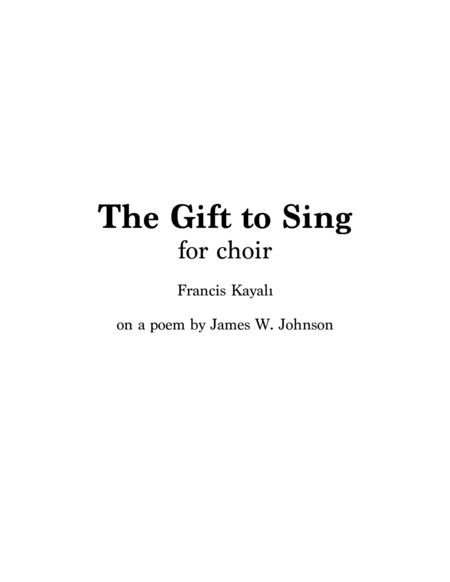Choral Choir (SATB) - Digital Download SKU: A0.973048 Composed by Francis Kayali. 20th Century,Contemporary. Octavo. 19 pages. Francis Kayali #6230277. Published by Francis Kayali (A0.973048). The Gift to Sing is a poem by James Weldon Johnson (1871-1938) published in 1917. The central theme of the text is one of optimism and resilience, using the power of song â meaning, more broadly, art or any kind of artful, heightened expression â to overcome adversity. Although the poem can be interpreted broadly to pertain to any kind of struggle, it is likely that Johnson, as a civil-rights activist was alluding more specifically to the oppression African-Americans in the United States, a struggle that continues to this day, in 2020. I composed this setting in September of 2020, right after the Black Lives Matter protests that took place that summer, so current events played a role in this interpretation on my part as well. If one reads the poem as pertaining the continued struggle of African Americans, some passages may come across as ambiguous. For instance, I brood not over the broken past should not be taken as suggesting that the horrors of the past should be forgotten, but as an injunction that the memory of these horrors should not discourage us or diminish our resolve to work toward overcoming the injustices. The musical inspiration for the opening of the piece comes from the song Lonesome Valley, which starts with a pentatonic melodic gesture. The pentatonic scale is often used in African American Spirituals, Christian hymns, and folksongs (e.g., Swing Low, Sweet Chariot, Amazing Grace, How Can I Keep from Singing?, Red River Valley, Oh Shenandoah). The more rhythmic parts take inspiration from the African-American spiritual tradition, as found for instance in the choral music of Moses Hogan (1957-2003). Meanwhile, the tenor solo at the end, is intended to be very loud, bright, and without the pronounced vibrato one would find in a Western operatic style. This kind of bright and intense vocal sound is not unfamiliar to most listeners, who may have encountered it in places as varied as Sacred Harp singing, the opening of the Lion King soundtrack, or the Muslim call to prayer.
